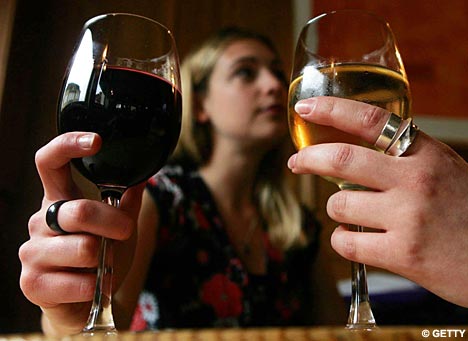关于饮酒与健康的研究不在少数。美国哈佛大学公共卫生学院一项最新研究显示,中年女性经常小酌或有助健康,可降低晚年患心脏病、糖尿病、癌症等病症的风险。
存在关联
哈佛大学公共卫生学院引用始于1976年的美国“护士健康研究”数据,收集其中大约1.4万名女护士的饮酒习惯和健康信息,从她们中年随访至70多岁,多数调查对象随访时间达16年。结果发现,比起酗酒或滴酒不沾的调查对象,经常小酌的人到70岁时健康状况更佳。

为研究饮酒与晚年健康之间的关联,研究人员分析调查对象58岁时的饮酒状况,把酒精摄入量精确到克而不是饮酒单位(8克)。通常一杯葡萄酒含酒精10克,一瓶啤酒含酒精13克。
数据显示,与滴酒不沾的人相比,中年女性经常摄入15克至30克酒精,健康活到70岁的几率高出28%;经常摄入5克至15克酒精,健康几率高出20%。所谓“活得健康”,指没有患上癌症、心脏病、糖尿病、精神疾病、记忆问题或其他机体不适等慢性病。
平均摄入
研究人员还发现,比起每周饮酒一两次,每周饮酒5至7次效果更佳,比滴酒不沾的人健康活到70岁的几率高出50%。
由最新一期《科学公共图书馆—医学》月刊发表的研究报告说:“数据显示,女性在50多岁时规律性地适度饮酒,有助70多岁时保持健康……即便是适度的酒精摄入量,我们也高度建议大家匀着喝,而不要攒到周末痛饮。”
研究中,日酒精摄入量超过45克被定为“酗酒”。调查对象中,98.1%在这一标准以下。研究报告写道:“美国农业部2010年饮食指南将‘适度摄取酒精’定为女性最多每日一次,男性最多每日两次……我们的研究支持这一推荐量。”
生活方式
但研究人员强调,研究并非说明酒精对人体有益,而是表明健康生活方式对健康所起的作用。
澳大利亚昆士兰大学助教杰恩•卢克说:“经常小酌的女性通常具备其他几个特点,比如积极社交、健康饮食、自身身体状况良好等,这些因素综合作用,达到所谓老年活得健康。”
研究报告作者之一孙琦(音译)说:“对滴酒不沾的人而言,我们并不建议为保健康而饮酒,因为有研究显示,对老年人而言,经常锻炼、保持合适的身高体重指数与健康联系更紧密。”
先前研究显示,女性若能养成健康饮食习惯、不吸烟、保持正常体重,对生活满意度高,那么患心脏病的几率会大大降低。
生物探索推荐英文论文摘要:
Background
Observational studies have documented inverse associations between moderate alcohol consumption and risk of premature death. It is largely unknown whether moderate alcohol intake is also associated with overall health and well-being among populations who have survived to older age. In this study, we prospectively examined alcohol use assessed at midlife in relation to successful ageing in a cohort of US women.
Methods and Findings
Alcohol consumption at midlife was assessed using a validated food frequency questionnaire. Subsequently, successful ageing was defined in 13,894 Nurses' Health Study participants who survived to age 70 or older, and whose health status was continuously updated. “Successful ageing” was considered as being free of 11 major chronic diseases and having no major cognitive impairment, physical impairment, or mental health limitations. Analyses were restricted to the 98.1% of participants who were not heavier drinkers (>45 g/d) at midlife. Of all eligible study participants, 1,491 (10.7%) achieved successful ageing. After multivariable adjustment of potential confounders, light-to-moderate alcohol consumption at midlife was associated with modestly increased odds of successful ageing. The odds ratios (95% confidence interval) were 1.0 (referent) for nondrinkers, 1.11 (0.96–1.29) for ≤5.0 g/d, 1.19 (1.01–1.40) for 5.1–15.0 g/d, 1.28 (1.03–1.58) for 15.1–30.0 g/d, and 1.24 (0.87–1.76) for 30.1–45.0 g/d. Meanwhile, independent of total alcohol intake, participants who drank alcohol at regular patterns throughout the week, rather than on a single occasion, had somewhat better odds of successful ageing; for example, the odds ratios (95% confidence interval) were 1.29 (1.01–1.64) and 1.47 (1.14–1.90) for those drinking 3–4 days and 5–7 days per week in comparison with nondrinkers, respectively, whereas the odds ratio was 1.10 (0.94–1.30) for those drinking only 1–2 days per week.
Conclusions
These data suggest that regular, moderate consumption of alcohol at midlife may be related to a modest increase in overall health status among women who survive to older ages.







